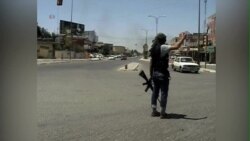WHITE HOUSE —
As the U.S. deploys hundreds of American troops to deal with the Iraqi crisis, the Obama administration is facing tough questions on whether the mission will inevitably evolve into a renewed, full-fledged involvement in the country.
With Sunni rebels consolidating control of more towns, there are questions about whether the deployment of up to 300 military advisers may be too little, too late.
President Obama dispatched Secretary of State John Kerry to Iraq this week to push for unity against the Islamist insurgents — and an Iraqi solution.
The U.S. troops are meant to give the Iraqi government the support it needs to put down the insurgency.
“This administration does believe that there is time for Iraq's political leaders to make the necessary decisions that will unify the country to confront the terrorist threat, the extremist threat that they're facing in Iraq right now," White House spokesman Josh Earnest said.
In addition to the combat-ready military advisers, the president has ordered up to 275 troops to safeguard the U.S. Embassy and other American interests in the country.
The job of the U.S. advisers is to assess the capabilities of an Iraqi military troubled by desertions and weak morale.
It may be difficult for the administration to keep troop numbers low, says Julian Zelizer, a political history professor at Princeton, via Skype.
"Once you send 300 people there at a minimum, if they recommend the need for more it's hard for the president to then ignore the very people he sent to find out what should be done," he said.
Past conflicts like those in Vietnam and Korea, he added, have shown how small deployments can become the opening wedge for much bigger operations.
"Each time the mission gets bigger, the involvement gets bigger," he said. "It's very difficult to contain these situations.”
In Iraq, where the situation is growing more fragile, and where the U.S. has already invested deeply, the challenge to limit involvement is perhaps even greater.
With Sunni rebels consolidating control of more towns, there are questions about whether the deployment of up to 300 military advisers may be too little, too late.
President Obama dispatched Secretary of State John Kerry to Iraq this week to push for unity against the Islamist insurgents — and an Iraqi solution.
The U.S. troops are meant to give the Iraqi government the support it needs to put down the insurgency.
“This administration does believe that there is time for Iraq's political leaders to make the necessary decisions that will unify the country to confront the terrorist threat, the extremist threat that they're facing in Iraq right now," White House spokesman Josh Earnest said.
In addition to the combat-ready military advisers, the president has ordered up to 275 troops to safeguard the U.S. Embassy and other American interests in the country.
The job of the U.S. advisers is to assess the capabilities of an Iraqi military troubled by desertions and weak morale.
It may be difficult for the administration to keep troop numbers low, says Julian Zelizer, a political history professor at Princeton, via Skype.
"Once you send 300 people there at a minimum, if they recommend the need for more it's hard for the president to then ignore the very people he sent to find out what should be done," he said.
Past conflicts like those in Vietnam and Korea, he added, have shown how small deployments can become the opening wedge for much bigger operations.
"Each time the mission gets bigger, the involvement gets bigger," he said. "It's very difficult to contain these situations.”
In Iraq, where the situation is growing more fragile, and where the U.S. has already invested deeply, the challenge to limit involvement is perhaps even greater.





